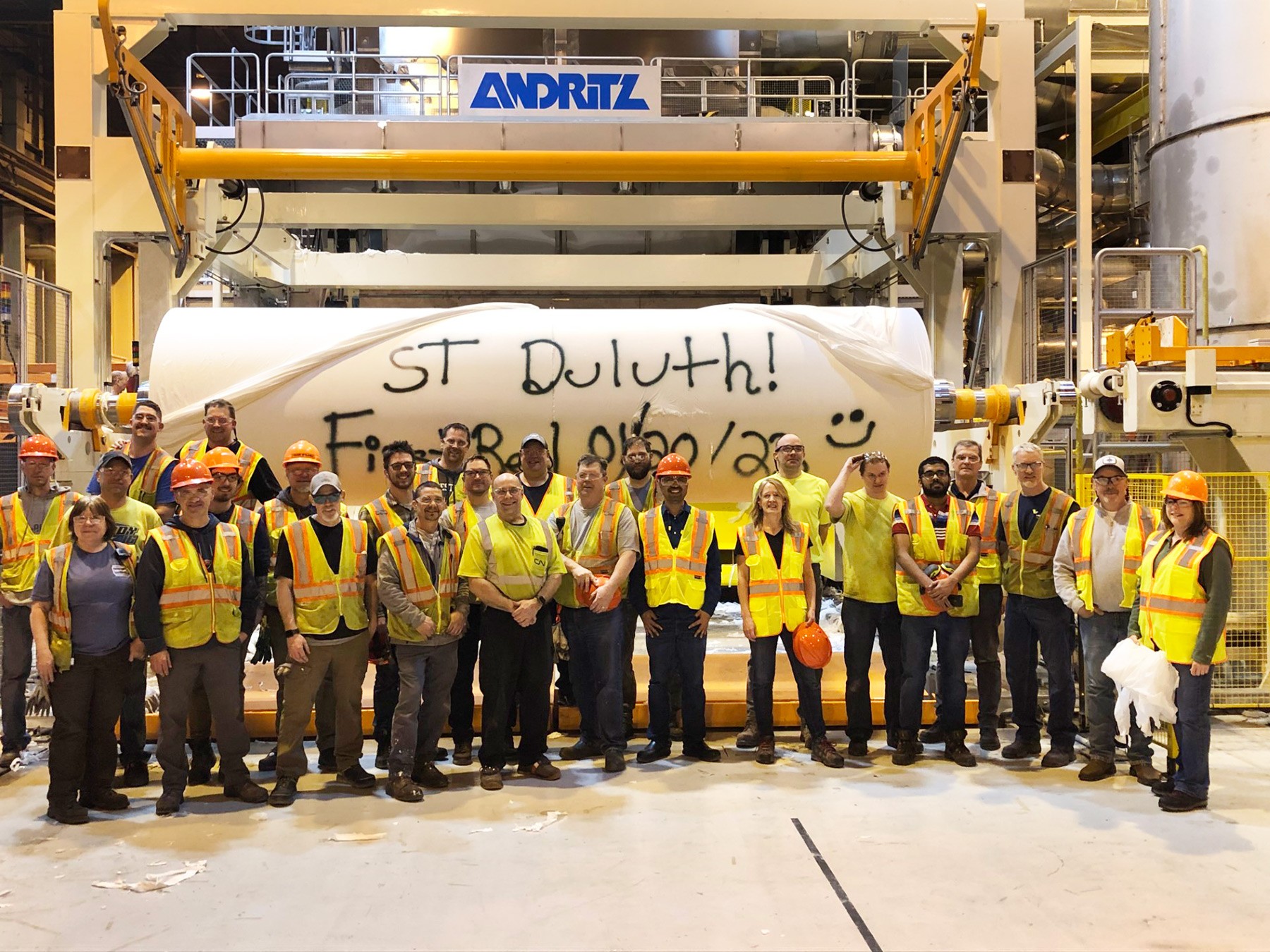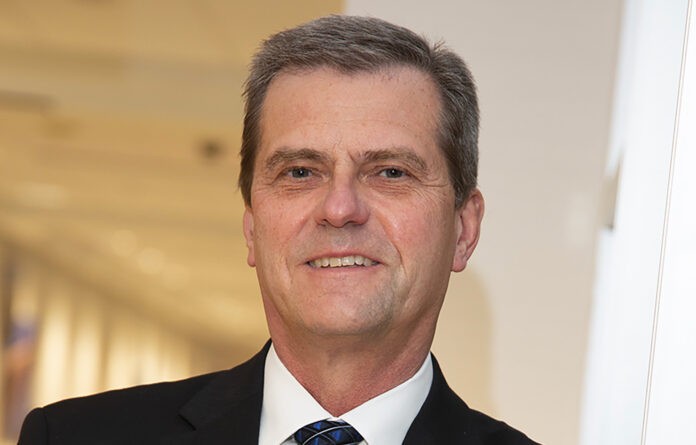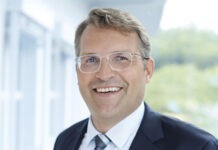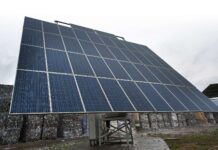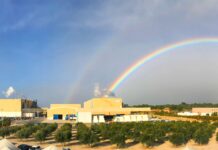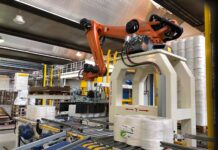With its latest investment – a PrimeLineTM W 2000 – started-up at its site in Duluth, Minnesota, in January this year, ST Paper is primed for further expansion. TWM interviews Senior Vice President and Chief Operating Officer Ron Thiry.
As the Teams video call opens, a framed image of what looks like the green and yellow of the Green Bay Packers dominates the central position of Ron Thiry’s office. Is it the famous NFL team celebrating a touchdown? “It is indeed!” he says. “I’m a Green Bay native. It’s in the blood!”
Born and bred in one of the world’s two key tissue hubs, Thiry’s career has taken him across stints at Georgia-Pacific, SCA, and Little Rapids, before joining family-owned independent tissue manufacturer ST Paper just under five years ago. Now the company’s Senior Vice President and Chief Operating Officer, he says he enjoys the flexibility of working for a fast growing, entrepreneurial company. The past few years have seen him fully involved in the company’s expansion, helping it navigate through the ups and downs of a global pandemic, acquiring a business, and overseeing the start-up of a new tissue machine that has added 30% production capacity to the business.
The group is now placed across three strategic locations in the US: its original mill site is based in Oconto Falls, Wisconsin, 30 miles north of Green Bay, and a second facility is in Franklin, Virginia, where the business has converted two fine paper machines into tissue machines, creating its ST Tissue division and expanding into the east of America. In May 2021, it further boosted its production capabilities after purchasing Verso Corporation’s idled Duluth, Minnesota-based mill, where it then installed an Andritz-supplied PrimeLineTM W 2000 high-speed tissue machine that was started-up in January 2023.
It’s this ability to “successfully add capacity in different ways” that he says is vital. “We use a low capital investment approach by re-utilising facilities that have been shut down or underutilised. We feel we have a different angle to bring to the market.”
With a design speed of 2,000m/min and a working width of 5.65m, the new tissue machine uses 100% recycled wastepaper or virgin fibre and turns it into parent rolls of bath tissue, facial tissue, paper towels, and napkins. “Our business strategy is solely to produce jumbo rolls for some of the larger integrated players as well as the independent regional converters,” he says. “The design of the Duluth machine and the systems surrounding it gives us the flexibility to direct that volume towards retail applications as well as the AfH market.”
ST Paper embarked on the Duluth project when “Covid was still on top of us,” he says. “So while we were confident that the AfH market would recover, no one could predict the timing. We had to make sure that we had the flexibility with this machine to go in multiple directions. We’ve already made products ranging from lightweight bath tissue to heavyweight towels with recycled fibre. We’ve made virgin pulp products, and some natural unbleached napkin and towel products. We’ve tested the flexibility of that operation.”
Anecdotally, he says he believes the American AfH market has rebounded close to 2019’s benchmark level, and that generally the country is back to a normal growth rate in the tissue market. “Over the years, tissue growth is typically 1-2% and we are probably back in that realm. At least from our vantage point, demand seems to be at that. For AfH, I think the mix of products has shifted a bit as fewer people are working from offices, so that may have affected the mix. But I’d say the hospitality side of the AfH market appears to be fairly healthy in the US.”
While there’s still “some noise” post-Covid with imports coming into the market or not coming into the market related to transportation costs and world economy, he’s at a point where he doesn’t want to keep continuing to use Covid as an excuse. “It’s new dynamics, certainly. Some companies weathered the whole Covid situation differently from others and we are seeing some reactions now in market dynamics taking place, perhaps partially because of what we all lived through.”
Will the North American tissue market likely see more M&A activity to help it re-balance? “Sure, there will be moving parts. In total the demand, the consumption, won’t change as fast. But things have a way of balancing themselves out over a period of time. Some companies have elected to take capacity out of the market, things move around. Other companies have gone through acquisition, repositioning. So there’s a good amount of dynamics happening. Some people are gaining business, others shedding it. For us, we need to follow who is taking care of that demand and make sure they are aware that we are here to step in and support them.”
With the Andritz start-up, does he foresee any product diversification for the company? “We will stay fairly close to our strike-zone, which is primarily the AfH segment of the market. The diversification would come with enhanced capability to service the At-Home market. Not only the machine capability that comes from Andritz but the capabilities we have at the Duluth site for handling virgin pulp, blending a variety of fibres. One of the key things that was attractive for us at the Duluth site was a very strong fibre recycling facility, and that is something we are looking to continue to leverage.”
Demand for recycling raw materials continues to be “high priority,” and Thiry says he hears more and more conversations about availability of white recycled grades, office paper and so on, in particular. “As fewer people are now working in the office, people are wondering if there will come a point in time when a certain number of products need to shift to virgin, or virgin recycled blends, to satisfy the fibre supply.”
Finding the skilled workforce is also a challenge, and he says businesses are always investing in automation and technology to reduce the labour intensity of those operations. “We are fortunate that half of our Duluth workforce had previous experience in the mill. They are quickly learning the nuances of making tissue, but their familiarity with the mill has been invaluable.”
The energy crisis, he adds, is another key challenge. “My understanding is that it is better here than it is in Europe, but we are feeling it as well. The natural gas market has also calmed down and stabilised, the electrical market here is undergoing some change as the emphasis is on greener power generation, and that is certainly driving higher rates across our portfolio.
At some point he adds it may make sense for the business to self-generate, using natural gas, or other readily available biofuels at the site, depending on whether the crisis levels off. “If it does level off maybe we can adapt, with a hard focus on energy conservation and consumption reduction. But we hope to see a stabilisation.”
The start-up in Duluth has been key in helping the business tackle such challenges, bringing it flexibility, increasing its production output, and enabling it to work with a range of customers. “The new machine has added 70,000tpy to our production capacity, so we are now producing 250,000tpy. As we don’t participate in converting, everything we sell is to other converters, the independent converters or the large integrated companies that have needs for specific products that they don’t have the ability or capacity to make to balance their supply chains. So nearly all of that 250,000tpy, say 90%, is directed towards the AfH market.”
The business needs to follow its customers where the demand is, he says. “As we are basically a contract manufacturer, we are here to fill in the gaps in our customers’ supply chain. We’re not in a position where we design a machine or a process and push a product out into the marketplace. So it is important for us to have the flexibility and work with a range of customers. This means that there are different types of challenges, but it’s a good place to be. We are a lean organisation and that allows us to be involved with all aspects of the business.”
Further growth will also be a key strategy: “Our company is committed to continue to grow, and our challenge is to be there for our customers to help them grow. So absolutely we continually look for the right opportunities to satisfy that growth. We bring a different angle to the market, and we will continue to look for those opportunities to be close to our customers to understand their requirements and look for the opportunities where we can execute a plan to effectively meet that.”
It is, as a Green Bay native would say, a matter of keeping the company on the offense.
